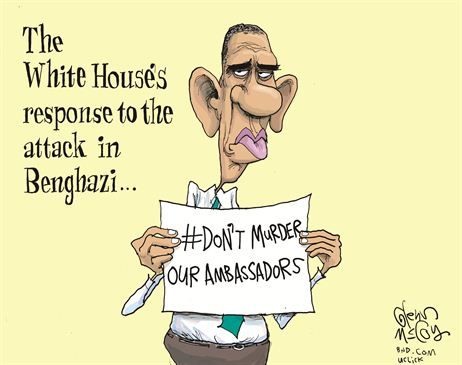Mass schoolgirl kidnapping in Nigeria — to tweet or not to tweet? Is hashtagging one’s indignation about some outrage abroad an exercise in moral narcissism or a worthy new way of standing up to bad guys?
The answer seems rather simple. It depends on whether you have the power to do something about the outrage in question. If you do, as in the case of the Obama administration watching Russia’s slow-motion dismemberment of Ukraine, it’s simply embarrassing when the State Department spokeswoman tweets the hashtag #UnitedForUkraine.
That is nothing but preening, a visual recapitulation of her boss’s rhetorical fatuousness when he sternly warns that if the rape of this U.S. friend continues, we are prepared to consider standing together with the “international community” to decry such indecorous behavior — or some such.
When a superpower, with multiple means at its disposal, reverts to rhetorical emptiness and hashtag activism, it has betrayed both its impotence and indifference. But if you’re an individual citizen without power, if you lack access to media, drones or special forces, then hashtagging your solidarity with the aggrieved is a fine gesture and perhaps even more.
The mass tweet is, after all, just the cyber equivalent of the mass petition. And people don’t sneer at petitions. Historically, they’ve been a way for individuals, famous or anonymous, to make their views known and, by weight of number, influence authorities who, in democratic societies, might respond to such expressions of popular sentiment.
The hashtag campaign for the Nigerian girls — originated in Nigeria by Nigerians — was meant to do exactly that: pressure the Nigerian government to respond more seriously to the kidnapping. It has already had this effect. And attention from abroad has helped magnify the pressure.
As always, however, we tend to romanticize the power of the tweet. For a while, Twitter (and other social media) was seen as a game-changer that would empower the masses and invert the age-old relationship between the ruler and ruled.
This is mostly rubbish. Yes, the tweet improves upon the mass petition because tweets contain an instant return address that allows for mass mobilization. People can be summoned to gather together somewhere — Tahrir Square, for example.
At which point, alas, the age-old dynamics of power take hold. If the tyrant, brandishing guns and tanks, is cruel and determined enough, your tweets will mean nothing. Try it at Tahrir or Tiananmen, in Damascus or Tehran. They will shoot and torture you, then maybe even let you keep your precious smartphone.
Michelle Obama’s tweeting #BringBackOurGirls for the nearly 300 schoolgirls kidnapped by Boko Haram terrorists poses an interesting case of the semi-official tweet. This was no exercise in vanity. She does advise the man who does deploy the forces and who in this case provided serious concrete support — intelligence, reconnaissance, on-the-ground advisers — to help fight the evil.
What was peculiar about her tweet, however, was its uniqueness: It’s the first time she’s expressed herself so personally and publicly about a foreign crisis. And she was nicely candid about the reason: “In these girls, Barack and I see our own daughters.”
The identity of the victims here — young, black and female — undoubtedly helps explain the worldwide reaction. Two months earlier, Boko Haram had raided a Christian school and, after segregating the boys, brutally murdered 59 of them. That elicited no hashtag campaign against Boko Haram. Nor was there any through the previous years of Boko Haram depredations — razing Christian churches, burning schools, killing infidels of all ages.
Nonetheless, selective outrage is not necessarily hypocrisy. There are a million good causes in the world, and one cannot be devoted to all of them. People naturally gravitate to those closest to their heart. Thus last week’s unlikely sight: a group of congresswomen holding a news conference demanding immediate U.S. action — including the possible use of drones— against Boko Haram.
These were members, like Sheila Jackson Lee, not heretofore known for hawkish anti-jihadist sentiments. No matter. People find their own causes. Their sincerity is to be credited and their commitment welcomed.
The American post-9/11 response to murderous jihadism has often been characterized, not least by our own president, as both excessive and morally suspect. There is a palpable weariness with the entire enterprise. Good, therefore, that new constituencies for whom jihadism and imposed Shariah law ranked low among their urgent concerns should now be awakening to the principal barbarism of our time.
Trending now (once again): anti-jihadism, a.k.a. the War on Terror.
Read more from Charles Krauthammer’s archive, follow him on Twitter or subscribe to his updates on Facebook.
Read more on this topic:

No comments:
Post a Comment